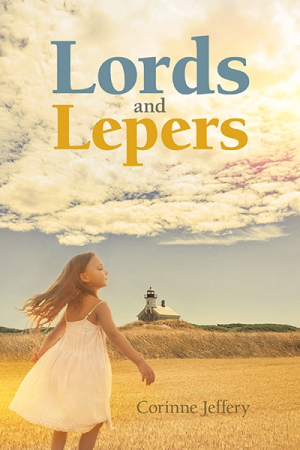
Lords and Lepers
Lords and Lepers is an engaging period piece with protagonists whose stories are not easily forgotten.
Across sixteen years in the 1960s and 1970s, four adolescent girls navigate the ups and downs of their personal friendships, school, and family lives in Corinne Jeffery’s substantial and engagingly perceptive work, Lords and Lepers.
Francine, Cassandra, Jessica, and Hope become a foursome in childhood thanks to the gentle and subtle prodding of their families. Francine is an orphan who comes to live with her twin uncles on their sheep farm at age six; she is the story’s central figure, through whom numerous other characters eventually connect, including the wise Patricia Rose, the teacher who eventually marries one of Francine’s uncles.
Country life on the farm and in the rural communities of southwest Manitoba is portrayed exquisitely and honestly. That the settings are real locales lends definite authenticity and background to the normal events and eventual tragedies as they occur. Francine is a sensitive spirit; she deals with bullies and issues with her good friends, especially Hope, a talented violinist on track to become internationally famous.
This very satisfying story is told through the individual characters, detailing their perspectives and timelines, which intertwine with those of other characters. As the girls get older, their timelines become more divergent. There are no chapter divisions, just short sections of several paragraphs divided by an asterisk; it’s not at all difficult to follow the story line, though. Time moves in an easily followed manner, but the ground that’s covered could as easily have fit into two books rather than this very lengthy one.
The lives, loves, and travails of the girls intersect and overlap throughout the book. Viewing sometimes multiple perspectives of a singular event is an interesting device that is used effectively. While events occur in the distant past, some issues dealt with are currently relevant. Jessica—who is of Chinese descent—faces overt discrimination in school; elsewhere, some question the closeness of the relationship between two of the girls.
The latter quarter of the book appears to focus more on Francine and Hope, while Cassandra’s and Jessica’s stories are pushed to the distant background. It’s heartwarming, though, to see that the girls’ families—the older generation—remain consistent, strong, and supportive throughout.
Backstories play a significant role for nearly all of the characters and are uniformly intriguing—with the exception of Alex Winston’s story. His motivations are unclear, and his family members exemplify unbelievable extremes. Francine’s behavior in connection with the Winstons is also somewhat jarring.
Family, love, and support are the story’s central themes, although there are also dark moments, particularly thanks to the introduction of the truly nasty Carole, whose downward trajectory is shown to parallel to the lives of the four main friends.
It is interesting to watch the foursome mature throughout the book, from their preteen years well into adulthood. Their dialogue grows with them. Writing is personable and intelligent, peppered with a distinct and high vocabulary.
Lords and Lepers is an engaging period piece with protagonists whose stories are not easily forgotten.
Reviewed by
Robin Farrell Edmunds
Disclosure: This article is not an endorsement, but a review. The publisher of this book provided free copies of the book and paid a small fee to have their book reviewed by a professional reviewer. Foreword Reviews and Clarion Reviews make no guarantee that the publisher will receive a positive review. Foreword Magazine, Inc. is disclosing this in accordance with the Federal Trade Commission’s 16 CFR, Part 255.
